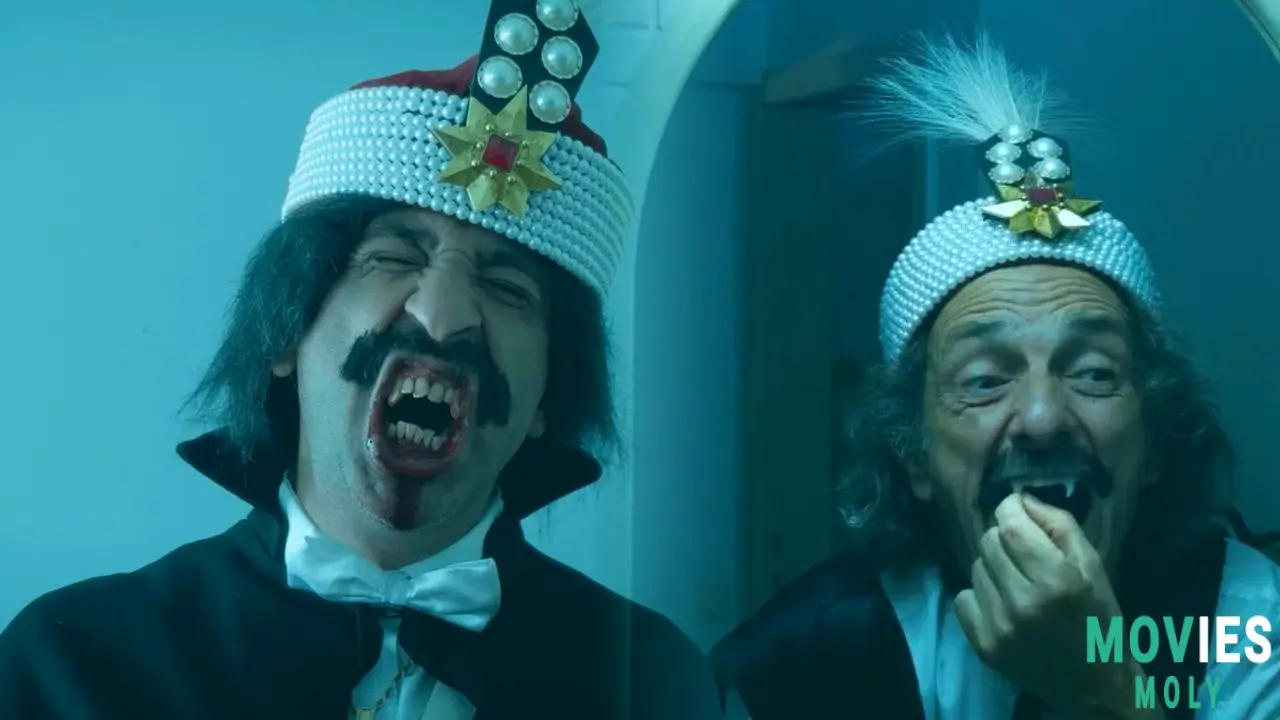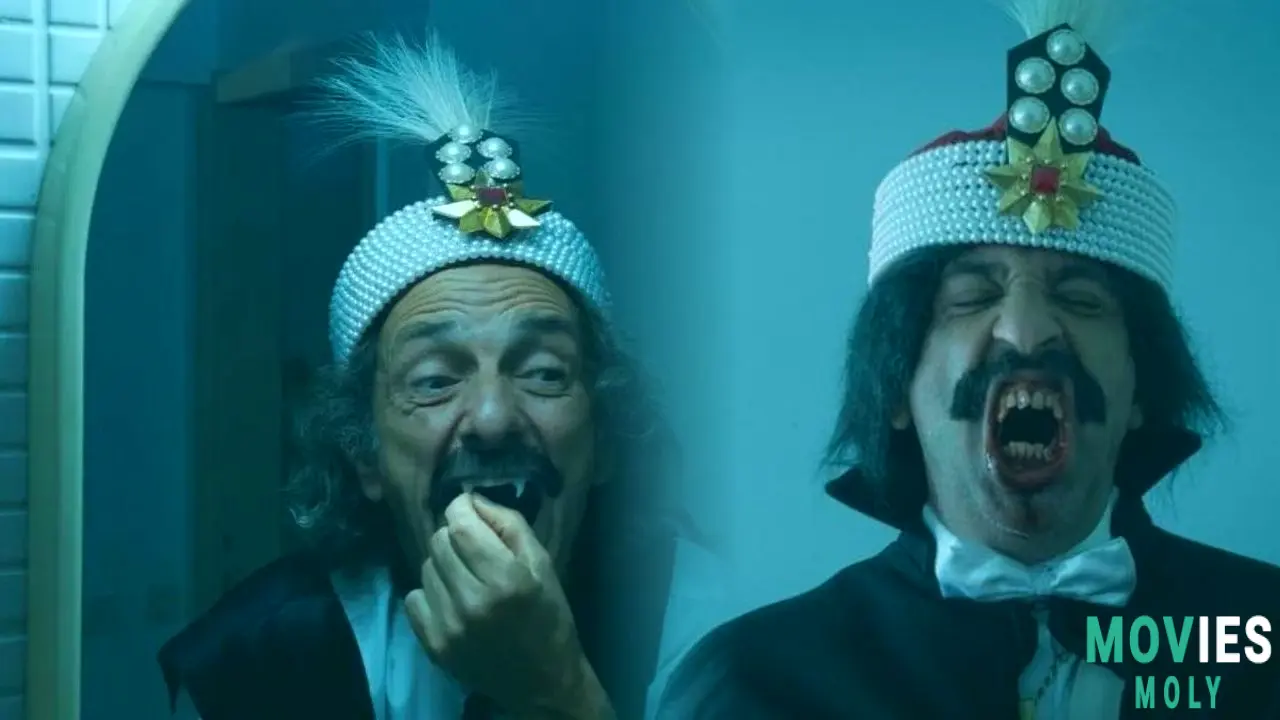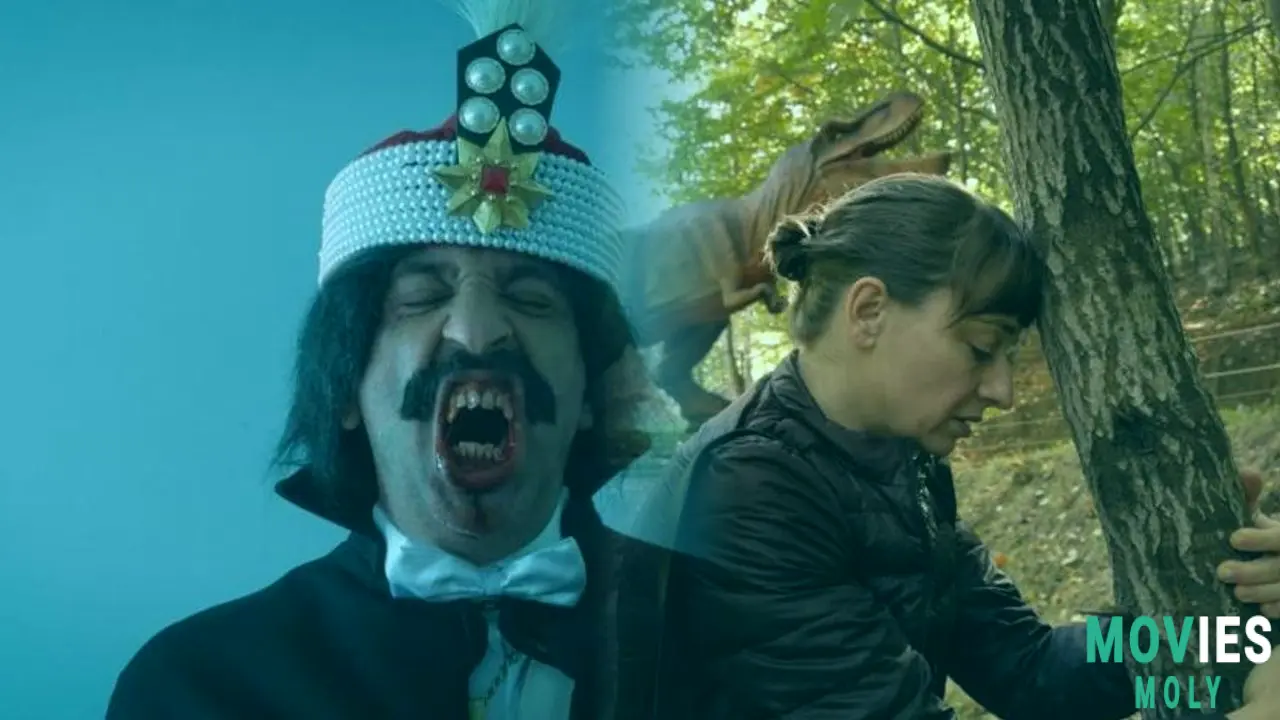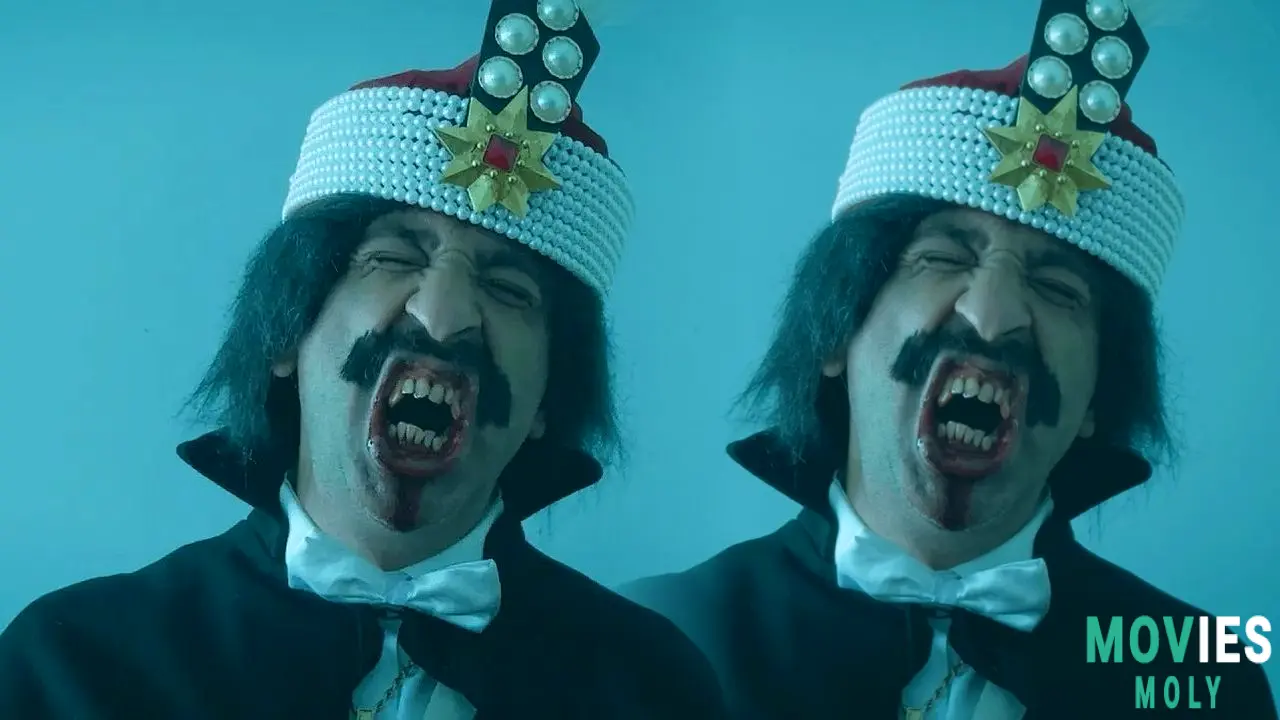Alright, let's talk Dracula. We all know the classic vampire tales, right? Bram Stoker's original has seen countless versions over the years. But get ready, because Radu Jude, a director known for pushing boundaries, has a new take arriving soon, and it is something truly else. His film, also titled Dracula, is a wild ride being released by independent distributor 1-2 Special. Just seeing the first trailer, you get a sense of its unique style. It has been called an "Absurdist, AI-Laced" version of Dracula, and that description hits the nail on the head. This isn't your grandma's vampire story; this is a whole new beast.
The official word on the film's premise really sells the strangeness. It asks: "What happens when a young and curious filmmaker challenges his creativity with the limitless possibilities of a fake A.I.?" What follows is a mix of stories, from old and new times, all revolving around the Dracula myth. Think a vampire hunt, zombies, and even Dracula crashing a strike. There is a science-fiction plot about Vlad the Impaler's return, an adaptation of the first Romanian vampires novella, a sad romance, a vulgar folktale, and a whole lot of AI-generated kitsch stories. And believe it or not, there's even more packed into this movie.
If that sounds intense, well, you are not wrong. Robert Daniels from Roger Ebert.com called it "f-cking nuts." After checking out the trailer, it is tough to argue with that statement. This film seems to defy easy categorization, taking the iconic figure of Dracula and throwing him into a blender with modern technology and a hefty dose of satire. It is a bold move, and honestly, we are here for it.
Exploring the Mind-Bending Ideas Driving Radu Jude's Dracula MovieTrying to sum up Radu Jude's Dracula is almost impossible without going back to its official description. This film takes the concept of a classic Gothic horror story and twists it into something completely unhinged. You might even wonder if you can call it a "Dracula" movie in the traditional sense. It really challenges what we expect from adaptations. Jude seems to have thrown out the rulebook and decided to just experiment, creating something genuinely new and, frankly, bizarre.
The movie reportedly has many scenes featuring sex, violence, and AI-generated content. You will also see vampires with rubber fangs and what the context calls a "plethora of penises." Yes, you read that right. This is one of those films you truly need to witness for yourself to fully grasp its wildness. Despite all this visual chaos, the film clocks in at a runtime of 170 minutes. Reviewer Daniels described the overall impact as if you "fed a bawdy medieval verse to ChatGPT." That gives you a pretty good idea of the unique, sometimes absurd, tone Jude creates.
Let's be clear about one important point: this version of Dracula is not trying to be serious. Not one bit. The narrator, played by Adonis Tanta, plays a key storytelling role. He sits in a stark cell in a bathrobe, explaining that he has orders to make a new Dracula movie using some in-universe AI models. This setup allows the film to comment on many of the things Hollywood is currently debating, especially the role of AI in creative work. A big part of the movie's purpose seems to be showing that an AI takeover could be an "eccentric nightmare" we should all try to prevent. It uses satire to highlight potential dangers, making it a "satirical piece of garbage that knows exactly what its purpose in this world is."
Understanding the Director's Unconventional Approach to Filmmaking

Radu Jude is not a director who shies away from controversy or peculiar ideas. He has a history of making films with long, thought-provoking titles like I Do Not Care If We Go Down in History as Barbarians, Bad Luck Banging or Loony Porn, and Do Not Expect Too Much from the End of the World. So, the simple title Dracula might actually be a bit of a trick, given his past work. His films are often described as adventurous and push the boundaries of cinema.
It is good to hear that both Dracula and his other New York Film Festival entry, Kontinental '25, are as "madcap and mind-blowing" as his previous creations. Jude is known for incorporating everything from explicit pornography to long takes that can make viewers uncomfortable. All of this comes wrapped in his signature "rascally socio-political satire." He is a filmmaker who enjoys creating a "taste explosion" for his audience.
Jude's Dracula is nearly three hours long. In it, he considers his home country of Romania's most famous anti-hero, all through the lens of artificial intelligence. Jude directly states his belief that "AI is a kind of Dracula" because it "feeds on others without asking permission." He adds, "It's parasitic by nature." He understands the "ongoing ethical debates" surrounding AI, but feels that "in that regard, it made perfect sense" for his film. This perspective allows Jude to truly explore the "unnatural awfulness" of AI, a thread he picked up from earlier works like the "hilariously grotesque" face filters in Do Not Expect Too Much from the End of the World.
A Look at the Visual Spectacle and Storytelling in Radu Jude's Dracula

The trailer for Dracula gives us just a glimpse into its peculiar world. You will see several different imaginings of the count, some of them involved in quite suggestive acts. There is a low-budget C-3PO lookalike, a child complaining she cannot stake Dracula through the heart, and a father with a full face tattooed on the back of his head. The film also features a vampire sprinting full speed through a hospital while pushing an elderly woman in a wheelchair, another pulling out his own fang with pliers, blood, and gunshots. This movie really packs a lot in. It is almost too much to describe; you simply have to see it.
The film's visual approach is also quite something. When the story needs a special effect that Jude cannot realistically afford, he reportedly creates "profoundly unaesthetic A.I. hallucinations." The uglier these AI-generated visuals, the better, it seems. This approach, while unusual, has a hypnotic quality. Watching a genuine artist take this "slop" and turn it into something compelling is part of the experience. It is a daring, thought-provoking, and "poke-you-in-the-eye punk shit" kind of movie. Many consider it unforgettable and a reason why Jude is one of the most important filmmakers working today.
The narrator, Adonis Tanta, who also appears in Kontinental '25, guides us through this madness. He feeds his AI machine a series of cues. For example, he might say, "Give us a musical story vibing on Murnau's Nosferatu, but also sexy." Then, Jude has his actors bring this "trash" that AI creates to life, embracing all its "misbegotten nonsense." The production clearly works with a very small budget, perhaps "ten American dollars," as one writer humorously put it. This includes "dime-store wigs" and a noticeable lack of filming permits. The confused people in the background watching these "maniacs run through the streets" actually add to the fun. This film openly plays with its low-budget style.
Critical Reception and Anticipated Release of Radu Jude's Latest Work

Dracula has already garnered some attention, achieving a 69% Rotten Tomatoes score. It first showed to audiences at the Locarno Film Festival in August. Soon, American cinema audiences will get their chance to experience it. The film is set for a limited theatrical run in the U.S. starting October 29. Mark your calendars if you are ready for something truly out of the ordinary.
Rory O'Connor, in his review, stated that Radu Jude is "one of the great filmmakers of the decade." O'Connor explained that Dracula is "ostensibly a satire on Vlad The Impaler," who appears in many forms throughout the film. However, its main target remains "AI learning models." O'Connor recognized that Jude created a film that is "crude and puerile by design," using technology's potential for "vulgarity and stupidity" while also exploring anxieties about what AI can do. While fans of Jude's more farcical films might quickly connect with its rhythms, O'Connor personally struggled to give it the benefit of the doubt, partly due to its 186-minute runtime.
The Double Feature: How Dracula Connects with Kontinental '25
The New York Film Festival showcased a fascinating double feature from Radu Jude: Dracula and Kontinental '25. While Dracula is a wild, AI-fueled spectacle, Kontinental '25 is a different animal altogether. It actually has a plot and characters, which sets it apart from the more abstract Dracula. The story of Kontinental '25 centers on Orsolya, played by Eszter Tompa, who gives a strong performance. She is a former law professor now working as a bailiff, tasked with helping to evict poor people from their homes. These evictions make way for a large German company to build boutique hotels. This is certainly not a job that typically makes a main character sympathetic.
Yet, Orsolya somehow manages to be sympathetic. She tries very hard, despite her difficult job, and constantly fails. The film becomes a sharp look at how well-intentioned people sometimes fail at every level. Orsolya means well. When we first meet her, she is tossing an old man out of a basement. She even brings military police. But she also rents him a van for his belongings and gave him a month to move out. She wants to take him to a local shelter herself, having already done similar things for others. She is friendly with the priest at the shelter, and she visits an old woman she evicted years ago during holidays.
This particular eviction goes wrong, forcing Orsolya to question her own liberal beliefs. Jude explores this by having her visit almost everyone she knows – her husband, mother, best friend, priest – and re-tell the story of the eviction. Each time, the details become more unhinged. She engages in extreme self-flagellation, talking about how she donates to good causes automatically and worries that volunteering would be seen as "poverty tourism."
While Dracula might be the more outwardly "psychotic" film, Kontinental '25 truly shows Jude firing on all cylinders. The agonizing comedy of Orsolya, who cannot see herself clearly, provides a mirror for the audience. Tompa's portrayal of this "soulless" struggle, as she complains about her injustice across the park benches and offices of Cluj, Romania, is both hilarious and unsettling. And speaking of Cluj, it just so happens to be in Transylvania. This geographical overlap, along with shared actors like Ilinca Manolache and Adonis Tanta, ties the two films together. Jude's consistent idea shines through: "we're all bloodsucking hypocrites underneath." But when it is this entertaining, who cares?
Final Thoughts on Radu Jude's Bold and Unforgettable Vision for Dracula
Radu Jude has delivered a film that defies expectations and breaks molds. His Dracula is not just another retelling of a classic tale; it is a commentary on modern society, the rise of artificial intelligence, and our own hypocrisies. By blending genres, incorporating bizarre visuals, and using a unique narrative structure, Jude creates a movie that is both provocative and unforgettable. It challenges viewers to reconsider what a film can be and what stories AI might help us tell – or perhaps warn us against. This is certainly a movie that will spark conversations and leave a lasting impression on anyone who dares to watch it. Whether you are a fan of traditional vampire stories or just curious about boundary-pushing cinema, Radu Jude's Dracula promises a one-of-a-kind experience.






